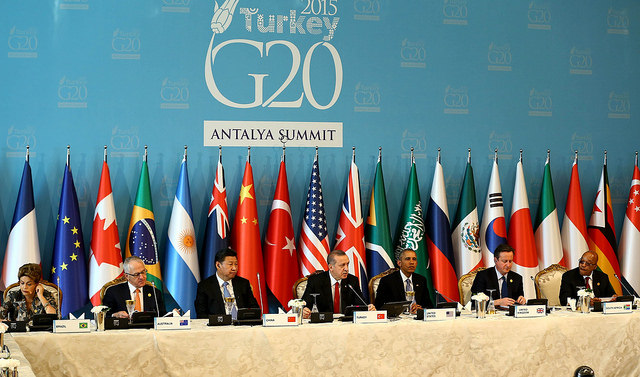rabble is expanding our Parliamentary Bureau and we need your help! Support us on Patreon today! Chip in to keep stories like these coming.
Antalya, Turkey — The 2015 G20 leaders’ summit, which has just concluded here in Antalya, Turkey, has made welcome progress in tackling the refugee crisis and taken some tentative steps towards the widening gap between rich and poor. However, the G20 has done little to build momentum toward an ambitious climate deal.
The good news is that G20 leaders have shown, in their commitments to refugees, that where there is a will there’s a way. They have recognized, for the first time, the scale of the refugee crisis and the need for a comprehensive approach to address it. This is a big deal and should be celebrated.
As conflicts continue to rage across the globe, millions of people have been forced to flee their homes — often taking desperate measures and using risky and at times fatal routes in the search for a safe and dignified life. There are nearly 60 million displaced people around the world. More people have been forced to flee their homes than at any time since World War Two and the number is rising.
The G20’s commitment to a bold new deal for refugees — ensuring their right to work, access healthcare and education and provide safe and legal routes to other countries — could make a huge difference to the lives of millions of people. The commitment by the Canadian Prime Minister — reaffirmed at the G20 — to resettle 25,000 refugees by January is a hugely helpful contribution to this.
The real work begins now — translating the G20’s words into action over the next weeks and months. Implementing the G20’s commitments will require a concerted effort by G20 countries, international agencies, host countries and the private sector. Urgency is the order of the day, as the situation for refugees continues to deteriorate.
Unfortunately the strong leadership shown on refugees was not matched on climate change. G20 leaders offered a fairly bland backing for a climate deal. They remained silent on many of the crunch issues including the need for increased climate finance, the need for more ambitious emissions reductions in the short term or a long-term goal to fairly phase-out all fossil fuel emissions. More ambitious cuts are needed if the world is to avoid catastrophic climate change.
The G20 also had nothing to say on the adaptation funding gap. Developed countries currently provide an estimated US$4-$5 billion in grants a year to help poor countries adapt — a fraction of the estimated US150 billion that is needed — yet continue to find billions of dollars in subsidies for the fossil fuel industry. This is simply outrageous.
There was better news for those concerned about the growing gap between rich and poor. The G20 signalled an important change of direction when it acknowledged you can’t have growth unless you tackle inequality. If this realization is followed by action — including more investment in education and healthcare — those at the bottom of the economic pile may, at last, get a foot on the ladder.
But reducing inequality also requires fixing the global tax system. As expected G20 Leaders endorsed the OECD Base Erosion and Profit Shifting (BEPS) tax reform package, which has been two years in the making. This is a step forward but it will not stop rich and poor countries alike losing billions of dollars in tax revenues to the corporate tax cheats. It is positive that the G20 recognizes the role of other international organizations, like the UN, IMF and World Bank to work with the OECD on the tax reform agenda. These organizations now need to work together with all governments — including developing nations who have been largely shut out of the BEPS process — to agree a second generation of tax reforms that build on the BEPS project.
The overall verdict? This was a good summit, with more positive outcomes than I have seen in the last 6 years of attending these meetings. But even where the Leaders made the right commitments, action is what counts. For that, we will have to watch carefully over the next few months.
Steve Price-Thomas is Oxfam International’s Deputy Advocacy and Campaigns Director, and G20 Summit Team Lead.
rabble is expanding our Parliamentary Bureau and we need your help! Support us on Patreon today! Chip in to keep stories like these coming.



